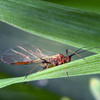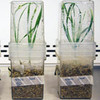The trial will test whether GM wheat plants are able to carry out photosynthesis more efficiently in the field and whether this trait could result in a higher yielding crop.
The trial will test whether GM wheat plants are able to carry out photosynthesis more efficiently in the field and whether this trait could result in a higher yielding crop.
Rothamsted Research, which receives strategic funding from BBSRC, submitted an application on 3rd November 2016 to the Department for Environment, Food and Rural Affairs (Defra) for permission to carry out GM field trials on the Rothamsted Farm between 2017 and 2019. The risk assessment was reviewed by the independent Advisory Committee on Releases to the Environment (ACRE), and a 48-day public consultation was carried out by Defra. ACRE is satisfied that all scientific issues raised by the public with respect to this application have been addressed. During this period and in addition to the formal consultation run by ACRE, Rothamsted Scientists have also spoken to and answered questions directly from the public, and special interest groups that have been interested in the research project and the trial.
Scientists at Rothamsted Research, in collaboration with researchers at the University of Essex and Lancaster University, have developed wheat plants that can carry out photosynthesis more efficiently i.e. convert light energy into plant biomass more efficiently. This trait has the potential to result in higher yielding plants. The purpose of the proposed trial is to evaluate the performance of the engineered plants in the field.
Ensuring food security is a major challenge given the projected need to increase world food production by 40% in the next 20 years and 70% by 2050. Wheat is one of the major grain crops worldwide and provides approximately one-fifth of the total calories consumed globally. However, wheat yields have reached a plateau in recent years and predictions are that yield gains will not reach the level required to feed the 9 billion population predicted for 2050. Traditional breeding and agronomic approaches have maximised light capture and allocation to the grain. A promising but as yet-unexploited route to increase wheat yields is to improve the efficiency by which energy in the form of light is converted to wheat biomass.
Professor Christine Raines, Head of the School of Biological Sciences at the University of Essex and principal investigator for this research project, said: “The efficiency of the process of photosynthesis integrated over the season is the major determinant of crop yield. However, to date photosynthesis has not been used to select for high yielding crops in conventional breeding programmes and represents an unexploited opportunity. But there is now evidence that improving the efficiency of photosynthesis by genetic modification is one of the promising approaches to achieve higher wheat yield potential.”
“In this project we have genetically modified wheat plants to increase the efficiency of the conversion of energy from sunlight into biomass. We have shown that these plants carry out photosynthesis more efficiently in glasshouse conditions. One of the steps in photosynthesis shown to limit this process is carried out by the enzymesedoheptulose-1,7-biphosphatase (SBPase). We have engineered GM wheat plants to produce increased levels of SBPase by introducing an SPBase gene from Brachypodium distachyon (common name stiff brome), a plant species related to wheat and used as a model in laboratory experiments” Christine added.
Dr Elizabete Carmo-Silva, co-investigator in this project at Lancaster University, added: “We have produced two types of plants, one in which two extra copies of SBPase are functional and one in which six extra copies of SBPase are functional. During the field trial, we will measure the photosynthetic efficiency of the plants in the field and we will determine total aboveground plant biomass and grain yield on an area basis at full maturity. We will also measure the number of wheat ears on an area basis and the grain number and weight per ear. From these data we will estimate the harvest index, which is the proportion of biomass allocated to the grain.”
Dr Malcolm Hawkesford, Head of the Plant Biology and Crop Science Department at Rothamsted Research and lead scientist at Rothamsted for this trial said: “We will perform the proposed controlled experiment in our already established facilities here at Rothamsted Research. This trial will be a significant step forward as we will be able to assess in ‘real environmental conditions’ the potential of these plants to produce more using the same resources and land area as their non-GM counterparts. These field trials are the only way to assess the viability of a solution that can bring economic benefits to farmers, returns to the UK tax payer from the long-term investment in this research, benefits to the UK economy as a whole and the environment in general. Here at Rothamsted we are very happy to provide any further information and explanation on this area of research”.
More information on this project can be found on our dedicated Questions and Answers Section on the Rothamsted Research website at http://www.rothamsted.ac.uk/our-science/efficient-photosynthesis-gm-wheat-trial
Contacts
Notes to Editors
Funding of the research project:
The proposed experiment is funded by funded by the Biotechnology and Biological Sciences Research Council (BBSRC) and United States Department of Agriculture (USDA) as part of the International Wheat Yield Partnership (IWYP) consortium activities.
About IWYP
The International Wheat Yield Partnership (IWYP) is an independent voluntary research funding consortium which responds to a major priority of the G20 sponsored Wheat Initiative. It will help the Wheat Initiative to fulfil its mission to coordinate wheat research and contribute to global food and nutritional security.
IWYP, established in 2014, represents a long-term global endeavour that uses a collaborative approach to bring together funding from public research and funding organisations from a large number of countries and further seeks to increase impact through public-private partnerships. Detailed information can be found at www.iwyp.org
Currently, this includes the Biotechnology and Biological Sciences Research Council of the United Kingdom (BBSRC), Grains Research and Development Corporation of Australia (GRDC), United States Agency for International Development (USAID), United States Department of Agriculture’s Agricultural Research Service (USDA ARS) and National Institute of Food and Agriculture (USDA NIFA), Department of Biotechnology of India (DBT), International Maize and Wheat Improvement Center (CIMMYT), Agriculture and Agri-Food Canada (AAFC), Institut National de la Recherche Agronomique of France (INRA), Syngenta Foundation for Sustainable Agriculture (SFSA) and Secretariat of Agriculture, Livestock, Rural Development, Fisheries and Food of Mexico (SAGARPA).
About the University of Essex
Ranked in the top two per cent of world universities, with three subjects in the global top 100, the University of Essex celebrated 50 years of excellence in education and research in 2014. Our students have ranked Essex in the UK’s top ten for satisfaction with their courses for the past four years. Founded to be daring and different, the University continues to challenge convention and conduct pioneering research which informs policy and changes lives. Placed in the top 20 UK universities for research quality, and consistently top for politics, we are an international community for original thinkers. In 2013 we were awarded the only Regius Professorship for political science by HM The Queen. Research informs our teaching, providing a transformational living and learning experience which equips our students with the skills, knowledge and curiosity to build successful careers and lead fulfilling lives. With more than 13,000 students from 141 countries, Essex graduates develop a genuine world view.
About Lancaster University
Lancaster University is ranked among the top 10 universities by all leading league tables in the UK and has a rising global reputation. It is the highest ranked University in the North West of England in the Guardian, Times/Sunday Times and Complete University Guide. It is also top for employability and student satisfaction in its region. 83% of Lancaster’s research is judged to be internationally excellent and world leading. The University has a strong focus on working with business and has helped create more than 5,000 new jobs.






